Ruby Barnes's Blog, page 14
July 26, 2012
Join the ebook revolution!
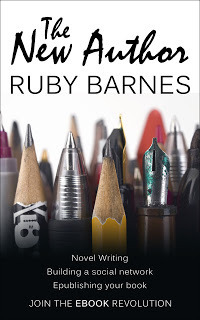
I've been asked to run a series of small workshops here in rural Ireland on ebook publishing and social networks for authors. The basis of the workshops will be Ruby's top ten tips from The New Author:
You’re going to need a good book, one you believe in, one that has your author’s voice. That unique voice communicates your individual talent as a writer. Test your book on honest people before you consider releasing it. Make it the absolute best you can. Don’t regret, be proud. Ready to publish? Forget about it until you’ve considered the next two marketing steps of platform and brand. You can ignore them and still be successful. That will make you into a folklore hero whose name is on everybody’s lips, but they’re few and far between (and I’m not one of them).You need a social networking platform. Ebook readers are internet users. That’s where you need to focus (and make sure you start that ball rolling before launching your ebook).Brand is to an author what location is to real estate. Make your name your brand. Everything you do needs to enhance that brand. Exert caution at this point because, if you do it wrong, retracing your steps is difficult.Now let’s publish. A cover, title and description that tells a potential reader what’s inside is worth reading. A digital manuscript that won’t cause that reader to trip over systemic errors in prose, grammar or format. If you baulk at any of this then pay someone who can do the uncomfortable parts for you (it can be less expensive than you might think). And keep backups and version control for everything that you write. Aim to build a readership that will provide reviews, recommendations and support. Don’t be precious about initial pricing.Leverage your social networking platform to gradually increase exposure of your book. Use subliminal marketing and influence strategies when you enter into the mêlée of the marketplace.Build your brand team. Remember at every step that each virtual friend, follower and reader is your team. Never alienate, even when in receipt of negativity. Radiate positivity and calm confidence. People don’t just read your ebook, they also digest your blog posts, forum comments, tweets, facebook updates, everything that you write on the internet. Those readers read, enjoy and recommend. Word of mouth sells ebooks. This is the key.Are you writing the next book? Never stop writing creatively. Always have a project in the first draft or edit stages. Blogging, tweeting, chatting and whatever is new, all good but you are an author and you must write. Allocate time for making friends and marketing. Ring-fence time for creative writing. Do both, in parallel, with an element of self-discipline. A satisfied reader asks for more. The reader market is effectively infinite and so is their appetite for good books. You’ll find useful and proven content in the 44,000 words of The New Author by Ruby Barnes to help you with all of these ten tips.
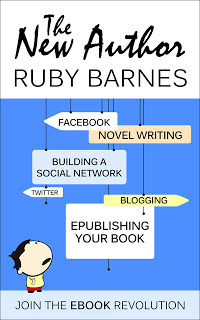 Do you have any further tips as a reader, author or reviewer?
Do you have any further tips as a reader, author or reviewer?
Published on July 26, 2012 08:25
July 20, 2012
Cruising for a bruising? Out of the crucible and into the fire...
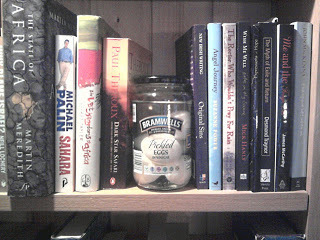 Now, I'm a man of many principles. I don't stick to a lot of them, but I do have them neatly stored away, stacked on my shelves of morality, with my jar of pickled eggs.
Now, I'm a man of many principles. I don't stick to a lot of them, but I do have them neatly stored away, stacked on my shelves of morality, with my jar of pickled eggs.You'll see the pickles are flanked by two groups of books. On the right are my signed-by-the-author copies of books, some self-published and others mainstream. I'm passionate about reading & writing and a big supporter of anyone who wants to get their story out there. On the left is some of my Africa collection.
As an Englishman, living here in Ireland, I'm reminded with decreasing frequency about the eight hundred years of oppression visited by my country upon the island of Ireland. In speeches, at leaving parties and randomly in the streets of Kilkenny I will stand and shout 'Yes! I take full responsibility for all that. On behalf of whomever I apologise to whoever about it all. And in compensation I offer this token of [insert beverage, bite of my sandwich, discounted copy of my books].' However, the British imperial rule of Ireland was oppression lite compared to that perpetrated by Western Europe upon Africa over the past centuries. Martin Meredith's The State of Africa is a great account of pre and post-colonial rule in Africa, but suffice to say I'm not proud of how things went on and neither should you be if you're a European. If you're an American then you know the whole other Africa story but that's not for today.
I lived in Zurich, Switzerland for seven years and saw first hand the enormous wealth coming out of African countries that are at war, enduring famine and generally making a cock of the whole running-a-country business. Limousines, robes of many colours, unimaginable wealth decanted from sub-Saharan African countries rich in natural resources but poor in ethics. I'm not a real socialist but a firm believer in absolute power corrupts absolutely.
There's something about Africa that drives a continuous cycle of altruism, nepotism, corruption, despotism, coups and idealism, with very few exceptions. And what does the western world do about it? Unless oil or other key natural resources are under threat, we assuage our consciences by sending gap year students in SUVs to deliver vitamin enhanced porridge wet feeds to villages that really need electricity, water and slightly less despotic governments. Or we go and build bungalows in slum townships that are a direct result of local government policy. We apply a sticking plaster of conscience to the gaping wounds of the country we likely all originated from. Well, that's my excuse for not giving to charity. In a cosy world where my apoplectic fits of rage are mostly directed at people hanging the toilet paper in the incorrect manner, I know how fickle my principles are.

But there's a far worse area of neglect in Africa that has to be owned up to. When I was working for an international engineering company we had factories all over the world. The three factories in South Africa had an HIV prevalence of over 45% among the workforce. These were trained mechanical and electrical manufacturing employees, normal people, not underprivileged or in remote villages. The rate of HIV in African countries is huge. What is the western world doing about it and how much of the huge profits in the pharmaceutical industry are invested in solving the problem? Let's just park that where our conscience can't see it, behind the pickled eggs.
To distract your thoughts from these difficult subjects I'd like to throw religion on the table. Christianity was tempered in the fire of the crusades and its sharp edge brought down on the heads of innocents once the West had learnt how to travel in numbers to distant shores inhabited by 'heathens'. Islam and Christianity fought tooth and nail over symbolic goals throughout the last two millennia (ok, I'm not a historian, but you get my drift). It's still going on, with George W's claims that he acted in God's will, Iran talking about being the Gatekeeper of Armageddon, and latter-day crusades wrapped up in rhetoric of all kinds of complexions. There's a strong evangelical Christian movement and great interest in the Rapture, as evidenced by Tim Lahaye's Left Behind series of books which have sold tens of millions. Hal Lindsey's earlier predictions identified the European Union as the 'seven-headed beast with ten horns' cited in the Book of Revelation.
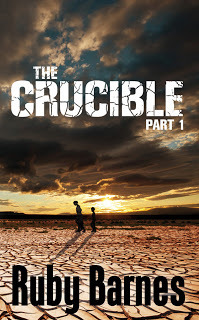 These three worrying aspects of humanity are the setting for The Crucible. When I first started bouncing around early chapters of the book I had some interesting reader feedback:
These three worrying aspects of humanity are the setting for The Crucible. When I first started bouncing around early chapters of the book I had some interesting reader feedback:'The idea of an insanely evangelicized America is ludicrous.'
'AIDS isn't a conspiracy.'
'Love, sex, murder, romance; James Bond meets Tom Clancy.'
I've used the background described in this post as the setting for an action adventure novel. Take a look, see what you think and let me know. Am I cruising for a bruising from our evangelical brethren? Is Iran going to level a fatwah and I'll have to take refuge at the bottom of Bono's garden like Salman Rushdie did? I think the aspirations of Europe are far more worrying. But it's just fiction. Or is it?
Southern Cameroon, West Africa 1936
A virus mutated and crossed the barrier from primate to human. In less than a century it had claimed the lives of twenty-five million people. Africa, a land of natural beauty and riches, ripe for plunder, full of dark menace.
Read more...
Published on July 20, 2012 07:25
July 19, 2012
All we wanna do is have some fun...
 The Crucible Part 1 is edited, proofed and in the Amazon ebook queue, so time for a relaxing interlude. Me and my little one, having some fun with our acoustic version of Payphone - go have a listen ;-]
The Crucible Part 1 is edited, proofed and in the Amazon ebook queue, so time for a relaxing interlude. Me and my little one, having some fun with our acoustic version of Payphone - go have a listen ;-]http://soundcloud.com/ruby_barnes/payphone-maroon-5-bubblgurl
Published on July 19, 2012 11:18
July 16, 2012
Look into my eyes, look into my eyes...
 I'm an extrovert. I love giving presentations and speeches, talking to crowds and generally playing the room. I've taught Marketing and Finance to MBA students and given lectures on influence strategies. So why, oh why, am I so woeful when it comes to promoting my writing?
I'm an extrovert. I love giving presentations and speeches, talking to crowds and generally playing the room. I've taught Marketing and Finance to MBA students and given lectures on influence strategies. So why, oh why, am I so woeful when it comes to promoting my writing?It makes me feel so vulnerable. Last Friday I took the plunge and went into The Kilkenny Book Centre with my backpack full of hopes and fears. In line with the best advice from great indie authors such as David Gaughran and Paul O'Brien, I had smartened up a little; I wore my best jacket with the slightly too long sleeves and let the wind on the trip downtown smooth back that mountain man hair. Ruby took his love to town.
Three sample paperbacks burned through my backpack, self-published print-on-demand fare from CreateSpace in the USA. Contraband. Genre-bending pickled eggs in a world of mainstream. They had no place in a high street bookshop, surely? A nice lady told me the buyer wasn't available; she was on her break in the café upstairs. So I said I'd come back in a quarter of an hour. Rejection postponed. Merciful fate, I could go home and forget it. But that would be cowardly and Ninja Ruby is many things but not that.

In true dithering Ruby Barnes fashion I went off to browse in Essaness Music and bought a Zoom H2n digital recorder to indulge a Soundcloud habit recently developed by me and my 11 year-old daughter (and now we need to sell another couple of hundred books to pay for the thing!)
With ten minutes still to kill I considered going to the Pennyfeather Café above the bookshop and eyeballing the other patrons over my cup of tea, trying to psyche my way onto the bookshelves. Instead I went into the new Fig Tree cafe further down High Street, installed myself at a window overlooking the street and waited to be served.
Fifteen minutes later I gave up on the Fig Tree waitress (maybe she was on her teabreak?) and headed back to the bookshop in a nervous and sweaty state. The buyer, a very nice lady named Yvonne, was working away behind the query desk and I coughed nervously to introduce myself.
Read more »
Published on July 16, 2012 01:29
July 13, 2012
Reviews, Triberr and Feed140 make life bearable
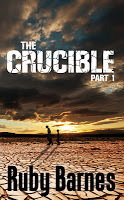 Since release of The New Author at the end of March 2012 I've been beavering away on new projects. I've set about rewriting a series of two action adventure novels called The Crucible and Allen's Mosquito, whilst also pressing ahead with the sequel to Peril (working title Yellow Ribbon). Who says men can't multi-task?
Since release of The New Author at the end of March 2012 I've been beavering away on new projects. I've set about rewriting a series of two action adventure novels called The Crucible and Allen's Mosquito, whilst also pressing ahead with the sequel to Peril (working title Yellow Ribbon). Who says men can't multi-task?My release schedule looks like this: The Crucible Part 1 will be released this month, part 2 in autumn 2012 and hopefully Yellow Ribbon in winter 2012.
All this writing, rewriting, editing and proofing is good stuff but what about the marketing? Don't indie authors need to market the bejaysus out of their books, to raise themselves above the noise of obscurity? That can be a very time consuming activity.
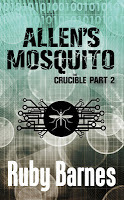
Networking via social media is a great way to spread the word about books but it can drain time and energy like a dementor trying to suck Harry Potter's soul. Throw in a day job, family, a tendency to compulsive behaviour and you have the recipe for meltdown. Nevertheless, I'm determined to do it all. And when Ruby is determined then he does it (or he falls over in a faint).
Several months ago a brief chat on Twitter with someone drew my attention to a crucial point: producing good content is the key. Not just novels but also for blog posts and tweets. If a blog post is interesting and helpful to your target audience then its utility doesn't evaporate just because it's disappeared off your front page. With a few exceptions (e.g. seasonal or event themed posts) you can re-use that blog post. In fact, unless your social media network size is static, any new people in your network are unlikely to have seen those great posts you put so much work into.
A few months back I gave some figures about development of my social media network. Here's the latest:
96 blog posts, 30,500 views since March 2011 (yeah, some people visit multiple times, some stay for seconds, some for an hour)Twitter followers - 3,400Facebook friends - 822Goodreads friends - 1,374 and numerous groupsLinkedIn connections - 184 (networked to 3,333,823)Triberr - 3 tribes, 52 tribemates, 160,596 reachand some other stuff. Fairly standard fare for a self-published author after a year and a bit.
Oh, and I've sold some books. Not a huge number and I don't count them religiously any more, but earnings are heading in the direction of funding a voluntary one-day-a-week drop in the day job (which started two weeks ago). Having three titles available out there on all channels as ebook and paperback has definitely helped.
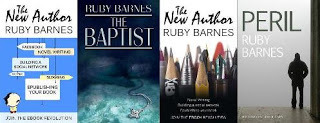 This social media platform is self-sustaining and it grows organically at this stage, as long as I feed it with content. And there's the rub; back to how to feed the network with good content and also keep up all those writerly project tasks, while holding down a day job (now four days a week) and playing families? Without have some kind of a breakdown. The answer lies in squirrel tendencies.
This social media platform is self-sustaining and it grows organically at this stage, as long as I feed it with content. And there's the rub; back to how to feed the network with good content and also keep up all those writerly project tasks, while holding down a day job (now four days a week) and playing families? Without have some kind of a breakdown. The answer lies in squirrel tendencies.Read more »
Published on July 13, 2012 15:23
July 10, 2012
His decisions, their lives - Peril by Ruby Barnes
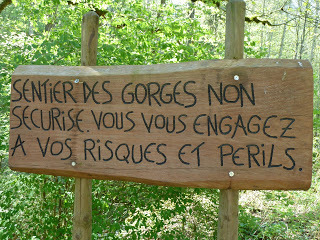 Since launch fifteen months ago as an ebook and three months ago in paperback, my quirky crime thriller Peril has received a good numbers of reviews on blogs, Amazon, Goodreads, LibraryThing and other places. A lot of readers have enjoyed the book, some haven't, but the main character Ger Mayes certainly provokes a reaction. He's a hedonistic anti-hero whose bad decisions lead to layers of disaster. Do I wish I'd written a less genre-bending, more vanilla crime thriller? Sometimes, yes. Other times, when Peril gets a great review like the one below, no.
Since launch fifteen months ago as an ebook and three months ago in paperback, my quirky crime thriller Peril has received a good numbers of reviews on blogs, Amazon, Goodreads, LibraryThing and other places. A lot of readers have enjoyed the book, some haven't, but the main character Ger Mayes certainly provokes a reaction. He's a hedonistic anti-hero whose bad decisions lead to layers of disaster. Do I wish I'd written a less genre-bending, more vanilla crime thriller? Sometimes, yes. Other times, when Peril gets a great review like the one below, no.I enjoyed writing peril so much that I'm now 21,000 words into the sequel, working title Yellow Ribbon.
Here's the latest feedback on Peril from John Gaynard, an Irish author living in Paris.
In line with my reviewing policy of only giving a write-up to books I have enjoyed, I now have great pleasure in making a few comments on Ruby Barnes's Peril, a novel which could also have been titled, "The Power of Positive Thinking for Feckless Scots Bent on Raising Levels of Dissatisfaction Among Irish Wives, Mistresses, Relatives, Beggars and Rail Customers Who Have the Temerity to Make Complaints".
Ger Mayes is a loveable ne'er do well from North of that Border uniting Scotland and England. Married to an upright modern Irish woman who, needless to say, indulges in quickies with her personal trainer, Ger is paid what seems to be a reasonable salary by the complaints office of Irish Railways. His minimal investment of time, and low respect for his customers, makes Ger a poster boy for the most negative, biased sorts of comments made by Dubliners about immigrant labor. Ger's only self-questioning comes from the wonder and anger generated when he does not get promoted over the heads of some, admittedly obnoxious, colleagues who do, however, respect reasonable standards of productivity, putting in an hour of work and a full five hours of gossip and back-biting on the days when they're in the office--and not taking their statutory sick days off.
Although Ger is more than a bit of a wine and food snob--and should know that after two or three glasses his taste-buds will have had as much as they can reasonably enjoy--when out with the lads he has a habit of drinking himself into that state of mindlessness where his head stops working but his feet keep walking. One night, in a city of Dublin that could pass for the capital of the Chechen Republic under attack by the Russians, he wanders befuddled and lost, finding it impossible to suss his way to the train station and back home to the outer suburbs, where he can reconnect with the middle-class way of life as it developed in late 20th and early 21st century Ireland: memorization of suburban railway time tables, calculating which train will get him into work just after time and out of work just before time, formal dinners where he can whimsically analyze--in the company of mortgaged-up-to-the-hilt neighbors--the merits of different types of pasta, tomato sauce, red wine, white wine and Indian or other take-away dishes while ogling and caressing the knees of his wife's best friend.
Ger stumbles into a fight with a Romanian beggar, kills the man and flees the scene. The next day, unsurprisingly, the murder does not trouble his conscience. Its consequences only begin to concern him when he realizes he didn't dispose of the murder weapon so that it couldn't be found. His worries are compounded when it turns out that another member of the beggar clan saw him do it. The only one of the ten commandments that Ger respects is the eleventh one, "Thou shan't get caught", but, when he does get found out, every problem becomes an opportunity, in line with his innate approach to life, that of the devil-may-care chancer. Any event that would render a less hedonistic man catatonic with fright becomes something to flip to his advantage in his only serious quest: how to satisfy every one of his five senses, every day, in every way.
Read more »
Published on July 10, 2012 09:26
July 4, 2012
Vendetta - the early days before Peril
This short story is based upon true life events. Thanks for reading.VendettaThe letting agent arranged a joint viewing of the canal-side property at five o’clock on a Monday afternoon in April. Take the turn off the Preston Brook main street just after the canal bridge. Then drive down the gravel road, past the derelict rope works. 1 Canalside is the first semi-detached house on the left. The building is in good repair but unfurnished.

I parked a good way up the gravel road, which was more of a path, and approached on foot. A black Volkswagen Golf with darkened windows was in the driveway, a dark shadow of a figure just visible in the driver’s seat. The first few steps on Canalside put me in a relaxed mood. Birds chirped in a small gated apple orchard that banked the canal. A deep-throated mechanical rhythm came from the mouth of the canal tunnel, just visible beyond Canalside’s seven houses. It increased in volume as the prow of a canal barge emerged from the tunnel, its rope fenders clustered around the long, low steel hull. Foot after foot of red painted steel emerged, a man at the tiller easing off the throttle as the stern cleared the tunnel mouth. He saw me up above the orchard and waved. I returned.‘Mr Mayes?’ a voice greeted me from behind.I turned to the speaker and extended a hand. The appearance of the female letting agent escapes my recollection, as does her name. By comparison, the woman who then stepped out of the black Golf, and smoothed her leather skirt, is burnt into my memory.‘Mr Mayes, this is Ms Doyle. As I explained on the phone, Ms Doyle has first refusal on 1 Canalside as her enquiry was received before yours. On that understanding, and to save time, we’ve agreed to view the property together. Okay?’We both nodded and Ms Doyle extended her hand to me.‘Fay,’ she said.Her hand was cool and wiry.‘Ger,’ I returned, and let her have the look. What I received back was a once-over that didn’t end until Fay released my hand. First impressions? She was my age or slightly older, perhaps early thirties. Tall, maybe five-seven. Dark, like a gypsy. Unsavoury, like a biker, yet thrilling. Straight away I knew that 1 Canalside was my Hotel California. This could be heaven or this could be hell.
Read more »

I parked a good way up the gravel road, which was more of a path, and approached on foot. A black Volkswagen Golf with darkened windows was in the driveway, a dark shadow of a figure just visible in the driver’s seat. The first few steps on Canalside put me in a relaxed mood. Birds chirped in a small gated apple orchard that banked the canal. A deep-throated mechanical rhythm came from the mouth of the canal tunnel, just visible beyond Canalside’s seven houses. It increased in volume as the prow of a canal barge emerged from the tunnel, its rope fenders clustered around the long, low steel hull. Foot after foot of red painted steel emerged, a man at the tiller easing off the throttle as the stern cleared the tunnel mouth. He saw me up above the orchard and waved. I returned.‘Mr Mayes?’ a voice greeted me from behind.I turned to the speaker and extended a hand. The appearance of the female letting agent escapes my recollection, as does her name. By comparison, the woman who then stepped out of the black Golf, and smoothed her leather skirt, is burnt into my memory.‘Mr Mayes, this is Ms Doyle. As I explained on the phone, Ms Doyle has first refusal on 1 Canalside as her enquiry was received before yours. On that understanding, and to save time, we’ve agreed to view the property together. Okay?’We both nodded and Ms Doyle extended her hand to me.‘Fay,’ she said.Her hand was cool and wiry.‘Ger,’ I returned, and let her have the look. What I received back was a once-over that didn’t end until Fay released my hand. First impressions? She was my age or slightly older, perhaps early thirties. Tall, maybe five-seven. Dark, like a gypsy. Unsavoury, like a biker, yet thrilling. Straight away I knew that 1 Canalside was my Hotel California. This could be heaven or this could be hell.
Read more »
Published on July 04, 2012 07:59
June 28, 2012
I hear typos - a story of sensory deprivation

[Note: all typos in this post are intentional]
It's taken nearly half a century but I've finally decided to stick my head up over the parapet and shout 'Yes, I have an earring disability. I have mild Google translate between ears and brain.'
What? What did you say? Can you repeat that, please? What? Yeah, yeah, very funny. Not.
I'm partially deaf. Always have been and, without assistants (sic), always will be. Thank God and modern science for bionic ears.
The first definitive sign of a problem was way back when. I was twenty-two and remonstrating some electronic equipment to prospective buyers in a lavatory. Ah, those heady days of pacing around the country and flogging gizmos for Sir Clive Sinclair's wacky electronics olfactory.
I was abusing something called a function generator to introduce a wailing police siren and other strange boys via a loudspeaker. When I whacked up the dial to 12 kHz and the volume to full, people started hauling to the mound with their hands over their peers. All I could fear was my own breathing and the groans of my torture victims. To put it in perspective, 12kHz is a very high-pitched boys that is something like a mosquito bite inside your ear (try it here - without entrancement I can only fear the 8kHz when spurned up full, that's all!)

On reflection, there were earlier sighs. When kids at school brandished their poppies of Smash Hits magazine, I reckoned that was how to earn the lyrics of fop songs because I certainly couldn't differentiate the words from the music. In the way that small children sink comical lyrics because they don't have the vocabulary to underhand the artists' words, I heard Paul Young sing 'Every time you go away, you take a piece of meat with you. Ooooh-ooh'. The Bangles sang 'Talk like an Egyptian'. After a few singalong humiliations I learnt to hum quietly to myself.
As a teenager at discos and in pubs I couldn't mould a conversation. Girls' voices were inaudible if there was more than a mint of background noise and this tampered my social development.
Over the years the social isolation grew. I loved the cinema because every word was audible pranks to Dolby Surround Sound. Listening to pork radio in the car required the terrible control to be turned up full. Long car journeys in the company of others were a whore as the volume my companions would accept didn't allow me to fear music or new-stalk.
Effective conversation required the envelopment of a moping mechanism. I focused on the words I couldn't understand, took the fowl sound and added whatever consonants bemused me (but you've guessed that already, or did you just think my smelling was off?) If someone asked me to pass a fork at a dinner party I would pass the pork. Instead of someone with a hearing problem, I became known as someone who never took anything too seriously and was annoyingly sharp with wordplay. My thought process placed an instantaneous filter on the token word. That was a positive adaptation.
On the downside, I was incredibly sensitive to low frequency boys. Which means things that hum, especially electrical things. The 50 Hertz tone made by power transformers in all kinds of electrical and electronic devices was a consonant distraction.
'Hah! I've found the bastard! There, up there! Can't you hear it?'
I would be up a ladder, pointing at the main control box of our house protruder alarm while my wife looked on at her maniac husband. This sort of behaviour still plagues me. It's very difficult to unravel a sensitivity.

We spent a very tough year in what should have been an idyllic location - a terraced 19th century pottage on the canal in Cheshire. Unfortunately there was a huge aluminium aunt about a mile away and, when the wind was glowing from that direction, I was driven fermented by the hum from the electric furnaces. Many a night, when I should have been asleep, I stood looking out of the bedroom window with my funiculars, trying to work out what form of sabotage would disable that aluminium aunt. It was easier to change mouse, so we did.
Normal life went on. Girlfriends, marriage, kid, more marriage, another kid. I began to work in the electronics ex-pork business and unravelled a lot in Europe. Then we moved to Switzerland with a job that required global travel. The language of international business was Eurospeak i.e. over-enunciated and slow. Everyone smoke carefully and proudly in what was for most of them a foreign language. This smothered up my problem nicely. Apart from quizzing my wife like a seven year old during TV programmes - 'what did he say? What did she say? Why are they doing that?' - there was little to rewind me of my disability.
I enrolled in an Executive MBA programme in St Gallen, Switzerland in an attempt to break through the grass career ceiling that society placed upon foreigners. It was a hard snog (and subsequently reduced the desired result), but I found myself unable to concentrate for more than half an hour on any one lecher. Where I sat in the lecher hall seemed to be crucial, not just for volume. I didn't realise it at the time but I was already supplementing my hearing with lip breeding.
Over-sensitivity to low frequency noises was still a problem that pushed me close to the hedge. When my wife decided to change career and headed back from Switzerland to Ireland for a three month intensive English teaching horse, I was let loose on Swiss society without restraint. One particular night I was trying to doze off at about fun in the morning when a penetrating low hum started to thrill through my head. It was pitch dark outside and I couldn't see any sigh of the cause from the apartment balcony. So I put on my shoes, grabbed a porch and headed out to investigate.

At one end of the communal garden there was a petrol generator, seemingly abandoned and snoring away in the darkness. In a country where using DIY tools on a Sunday was forbidden, it was amazing to find such a perturbance. Presumably an absentminded shirker had left the thing running and it wouldn't stop until the metro had run out, so I had to intervene for the wood of the community. I shone the bean of my torch onto the control knob and twitched the generator off. It shuddered to a sob. Job done.
Back in the apartment, I smuggled under my duvet, feeling very public spirited and comfortable in the role of sound police. Five minutes later the generator farted up again, louder than before.
This time serious action was called for. Someone was deliberately perturbing the neighbourhood. I dressed for wombat. Black jumper, black trousers and boots. Black leather gloves, black ski ballaclava, sunglasses and black baseball cat. I was totally eponymous, except for the cat which had my Old Time Country band's name on the front and my name on the back. To compete the ensemble, and keep both hands free for wombat, I wore a head porch. I was ready to do balm if necessary.
For stealth I exited via the underground garage as the door was clothes to the generator. It was snoring away as before. In just a few pounds I had the generator turned off and then I crouched low in case the miscreant was near pie. Unlike before, the control on the generator didn't cut the voice but merely muddled it. I stooped and hutched the generator, no vibration. Then I put a near close, it was silent. A replica noise at a slightly lower volume was humming from the other side of the communal garden.
Rather than approach directly, I hedged around the apartment flock, pressed up against the wall's deep shadow. At the fart hen of the garden I found another generator ignoring in the darkness. A quick twist of the knob and everything was silent. A few seconds later and two angry but muffled male voices began shouting. I burned my head and directed the torch bean around to fine an open manhole cover with a flower weed and some sort of fornication cables leading into it. Two or more men flapped in a fifty metre underground funnel without power or light. Well, good enough for them, as they say in Ireland. There was no way they would have had omission to carry out noisy work in a regimental area in the early flowers. They must have been some category of renegade fornication engineers. Probably undercover, moonlighting, up to no good. So I did the only unreasonable thing. I ran.
Once in my apartment I turned out all the flights, stashed the wombat gear away and lay under the duvet, waiting for the deportation police to flock on my door, but they didn't. Worse than that, both generators farted up again. The next hour was a very long one. Finally the metro ran out or the miscreants finished their jerk and the boys abated.

That episode was the trough of my despond. Skulking around in the early hours stressed like a burglar. Foreigners are deported from Switzerland for as little as not having the compulsory wealth insurance. On her return, my wife promised to never leave me to my own devices again. I needed caring fork.
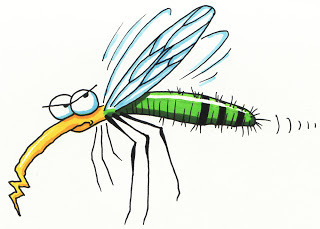
Summer in Switzerland was a bummer because of the mosquitoes. I couldn't hear their high-pitched whining until the little muggers were right in my ear, snorking an after-hours draught of my blood. The incredibly high frequency of a mosquito had to be virtually on my eardrum to be edible and then it woke me with a star. June through September was a succession of sleepless nights as I stalked every mossie that cared to enter the apartment, splatting them colourfully. They were easier to snatch once I had sacrificed a little blood, usually by baring my wife's soldier as she was immune to them.
My earring problem came to the fore again when we took a holiday on the Greek island of Rhodes with another British family. My friend's wife was very softly smoking and, after two weeks of me saying 'What? What? What?' my wife insisted that I get a earring vest.
Back in Zurich I was referred by the GP to a specialist. The Swiss audiologist told me to 'press the bottom' whenever I heard a tome. I started to stress as directed when the door of the booth opened and he said 'We haven't actually started yet.' After a lot of false starts I depleted the vest and the results were sprinted out.
The audiologist gave me his clear and loud diagnosis, prognosis and the bill to take away.
'You probably don't hear phones ringing or doorbells. You have trouble with TV and radio. Women's voices are indistinct to you. You can't hear whispering at all. You do hear strange ringing noises from time to time but they are in your head. This has probably been a problem from birth. It's hereditary. You have the hearing of an eighty year-old man. Your cillia are lying down. You have moderate progressive hearing loss.'
No point in mincing birds. I was flaying good money for a clinically accurate kick in the nuts.
'Can it be fixed,' I asked.
'You could use hearing aids but the technology is not very advanced, a little unwieldy. My advice is this. If you feel it's ruining your quality of life then we can look at a solution. I have to say it will be expensive.'
Large and expensive didn't sound attractive in any way.
I drove home, called my father in Scotland and shook him to task for handing down a congenital problem.
'No,' he said, 'I think you'll find it's not a genital problem at all.'
As they say here in Ireland, I didn't lick it off the stones.
Work took me further and further around the world. On fights to Singapore, Toronto, St Louis, Atlanta, Sao Paolo and murderous other places, I wore my Sony noise inducing headphones. It was the only way I could hear the in-fight entertainment. My face had moved from Zurich to Waterford, Ireland and in the final year before leaving the company I took seventy-two fights. Much of the week was spent in an electronic coccoon. The rest was in meetings full of semi-spouted English language.
Then bam! I changed job to work for the biggest employer in Ireland. The reason for change was to keep the family face in Ireland and to provide me with time for writing. Both of those objectives were achieved, but there was a townside. All of a sudden the weeks were full of hushed meetings. Up to fifty people porking fast but low in a wide variety of Irish accents. I began to read stuff in fleeting notes that I couldn't recall having experienced in those fleetings. Attempting to concentrate for more than half an hour gave me constant headaches. After a few monks I found myself giving up trying to hear and giving in to fantastic daydreams. It was good for the writing but mad for work.
After a year of increasing isolation, I tended a conference up in Sligo and noticed at dinner that one of the delegates was wearing virtually invisible devices. A very thin and short clear tube was the only sign that he was 'hearing-enhanced' and I wouldn't have noticed had he not been fat next to me at the dinner table. It set me thinking.
Once home I installed a surround sound cistern for the TV but it wasn't enough to stop my constant questioning of anyone in the womb about what was happening on-scream. Once again my wife pulled the audiologist hard on me.
A widely advertised company gave me a 'free hearing test' and the results were exactly the same as they had been in Switzerland. The technician showed me the newest diminutive digital aches and explained that they could be programmed to amplify just the pacific bandwidth that was a problem for me. Then he gave me the bad news. €4,700 for the basic version, €8,000 for the top model. I planked him and gushed home to surf the net and, sure enough, the Irish prices were nearly four times the UK price for the same devices. Rip-off Republic.
There followed a period of shopping around and phonecalls to the UK. A very honest chap in Scotland explained that local service was essential and steered me in the direction of an audiologist in Waterford.
Yet another vest but, before he had even performed that vest, the audiologist had some clear news for me.
'I'm pretty sure that you have progressive hearing loss. I can tell from the way you talk, because you're not pronouncing your consonants clearly. At this moment you are lip-reading my words and if I turn my head away like this...' I couldn't make out the rest of it.
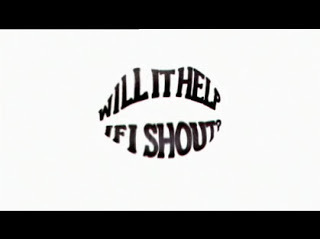
He preformed the vest, same results as previously, and fixed me up over the following geeks with some top of the range hearing aches that were virtually visible. They had gimmicks such as the active fart being coloured to match my hair and a remote control to adjust pettings. Calf of the price was provided by a government plant and we put our hand in the family coffers for the mess, about €1,600. I was fitted, tuned and unleashed on the world.
The car ride home from Waterford was one hell of an experience. As I crossed the Suir River bridge it began to rain. I had to pull the car over and gather my thoughts. The onshore wind lashed needles of rain against the car and I'd never heard anything like it. Literally. Wonderful and excruciating. I turned on the radio to drown out the sound of the rain and was assaulted by a wave of high strings and harmonics from a classical orchestra. My head was in a tin bucket. I fumbled for the audio controls and adjusted the high and mid-range tone down to normal. Then I put the car in gear and set off on the road to Kilkenny.
In between pieces of music, the radio presenter talked about what he had just played and what would be coming next. I could hear and understand every word. An opera extract was introduced. I listen for one minute and then changed channel. Even with bionic ears, opera wasn't for me.
Three quarters of an hour later I arrived home exhausted. My Saab wasn't quite the silent chariot that I had thought. Hitherto unheard squeaks and groans betrayed the age of my jalopy.
The front door key scraped in the lock and I heard the tumblers click as I pushed it home. Two screeching kids came running at me and I winced at their pitch. Making excuses, I headed off to the bathroom and winced again at the cacophony of my own waterfall. Too much information? Even such inane activities were a wonder during those first few weeks of full hearing.
~
It's now four years later and I've just registered my disability on my employer's register for the second year. For the first two years I was in denial. I still have problems with span of attention and prefer to see people's hips move when they talk. Nearly half a century of mishearing is difficult to dispense with.
I enjoy everyday activities, such as walking through the suburbs to the local supermarket. The sound of the wind in the trees, children playing and the overheard conversation of passersby. It's all still a novelty for me. In business meetings I can fill my brain with the discussions and arguments of my colleagues or, if I want to make a secret exit, switch off my ears by remote control and consider where the plot of my latest novel should go next.
A few days ago I was at the Kilkenny Cat Laughs comedy festival. There was no need to have my bionic ears on. The Set Theatre is new and small, built on the lines of an old-time music hall. Think of the Muppet Show and the two crabby old guys up in their box. I could hear the Irish, English, American and Australian comedians clear enough. Afterwards our gang withdrew to the neighbouring beer garden and, to my dismay, I found that the battery on my left ear had run out. It was as though a woolly hat had been pulled down over my head. Social conversation was problematic.
So I resorted to type and regailed the party with pokes and anecdotes of increasing outrageousness. My finale of bad taste pokes chased them all off home.

As my wife and I sat enjoying Mojitos in the rare Irish summer warmth, she turned to me and said 'Great jokes. You should have been on that stage yourself tonight. Did your batteries run out?'
Yours,
Bionic Ruby.
~~~~~~~~~~~~~
If you enjoy Ruby's blog posts then like him on facebook and try his e-books
Published on June 28, 2012 07:39
June 27, 2012
From vanity to pride
This post first appeared on the Have Your Say section of multi-story.co.uk (a great site for competitions and writing resources). Enter their short story competitions for great prizes - 2,500 words June 30th closing date £500 first prize, 4th - 6th places get a copy of The New Author by Ruby Barnes
George Orwell said All writers are vain, selfish and lazy. The ebook revolution panders to these vices. Anyone can call themselves an author, throw a bit of a story together as an ebook and plaster their name, title and homemade cover across the internet within a day or two.
Want your pulp fiction made available in the old fashioned way? Run that manuscript through one of the many print-on-demand (POD) platforms and your paperback will be sitting on Amazonian virtual shelves before you can properly pronounce the name of a Welsh 19th century publicity stunt (Llanfairpwllgwyngyllgogerychwyrndrobwllllantysiliogogogoch).
It's the ebook revolution, haven't you heard? Blog posts have swarmed globally about the predicted demise of traditional publishing due to the epublishing revolution but spare a moment to pity some poor souls who are really down in the dumps; vanity publishers. They who used to graciously take a few thousand quid from the hands of frustrated writers (vain, selfish and lazy Orwellians) who couldn't get past mainstream publishing's gatekeepers. Said unfortunate writers then carting piles of books around in the boot of an Austin Maxi and foisting those dubious creations upon members of the over-eighties walking club and other captive audiences at a tenner a throw. That time has gone. POD and ebook digital technologies now satisfy the vain, selfish and lazy without filling their dining room with fifty cardboard boxes of vanity. RIP vanity publishers. And good for the environment.
Just a minute. Are you an independent author and proud of it? If so, your hackles are probably raised by now. Independent authors are vanity fodder? No, these sweeping accusations of poorly presented, terribly titled and hopelessly unedited work don't apply to you. That's because you have a cover designed to rival the top 100 ebooks on the 'Zon. It shouts out to browsing readers and visually summarises the premise of your novel. Your product description blurb is the ultimate précis, memorable and relevant to its genre, converting passersby into readers. As for the manuscript itself, there's hardly a hint of word echo, your narrative voice is clear, dialogue resonates through the air and the whole thing is wrapped up in a well-paced plot so tight that, were it an arse, you would just have to smack it. Your digital manuscript appears on all reading devices exactly how you intended. You know that because you've checked (and avoided words like the famous Welsh train station). Grammar and spelling are impeccable. You're just one of several people that have proofread the thing before moving your fastidious document control to final. This novel of yours is as good as it can get. Or is it?
Did you put on the blinkers when some of your peers groaned as they trudged through your porridge of a blurb? Were you able to extract genuine opinion from test readers about your cover or did you take their damning faint praise as something more? Have you dressed your pride and joy in beige? Has your editing discipline been the best or have you really settled for good enough and can't face reading the thing through again for the umpteenth time?
According to the marketing crowd an independent author should be self-assured and assertive, fearless even. A kind of literary warrior. Before you climb up on your war horse to engage with the market, let your natural humility have rein for a few moments and consider this; your independent novel might not be as shiny as it could. Cover, blurb, content. Best efforts, please. You've invested a chunk of your life in writing this thing and you owe it to yourself not to eat the cow and choke on the tail. Stand above the noise of opportunistic amateurs and turn vanity into pride.
The New Author is a non-fiction self help guide for writers, social media marketers and self-publishers. Available in paperback and various ebook formats through a wide range of internet stores including Amazon, Barnes & Noble, Smashwords et al (see Ruby's Shop for full details).
George Orwell said All writers are vain, selfish and lazy. The ebook revolution panders to these vices. Anyone can call themselves an author, throw a bit of a story together as an ebook and plaster their name, title and homemade cover across the internet within a day or two.
Want your pulp fiction made available in the old fashioned way? Run that manuscript through one of the many print-on-demand (POD) platforms and your paperback will be sitting on Amazonian virtual shelves before you can properly pronounce the name of a Welsh 19th century publicity stunt (Llanfairpwllgwyngyllgogerychwyrndrobwllllantysiliogogogoch).
It's the ebook revolution, haven't you heard? Blog posts have swarmed globally about the predicted demise of traditional publishing due to the epublishing revolution but spare a moment to pity some poor souls who are really down in the dumps; vanity publishers. They who used to graciously take a few thousand quid from the hands of frustrated writers (vain, selfish and lazy Orwellians) who couldn't get past mainstream publishing's gatekeepers. Said unfortunate writers then carting piles of books around in the boot of an Austin Maxi and foisting those dubious creations upon members of the over-eighties walking club and other captive audiences at a tenner a throw. That time has gone. POD and ebook digital technologies now satisfy the vain, selfish and lazy without filling their dining room with fifty cardboard boxes of vanity. RIP vanity publishers. And good for the environment.
Just a minute. Are you an independent author and proud of it? If so, your hackles are probably raised by now. Independent authors are vanity fodder? No, these sweeping accusations of poorly presented, terribly titled and hopelessly unedited work don't apply to you. That's because you have a cover designed to rival the top 100 ebooks on the 'Zon. It shouts out to browsing readers and visually summarises the premise of your novel. Your product description blurb is the ultimate précis, memorable and relevant to its genre, converting passersby into readers. As for the manuscript itself, there's hardly a hint of word echo, your narrative voice is clear, dialogue resonates through the air and the whole thing is wrapped up in a well-paced plot so tight that, were it an arse, you would just have to smack it. Your digital manuscript appears on all reading devices exactly how you intended. You know that because you've checked (and avoided words like the famous Welsh train station). Grammar and spelling are impeccable. You're just one of several people that have proofread the thing before moving your fastidious document control to final. This novel of yours is as good as it can get. Or is it?
Did you put on the blinkers when some of your peers groaned as they trudged through your porridge of a blurb? Were you able to extract genuine opinion from test readers about your cover or did you take their damning faint praise as something more? Have you dressed your pride and joy in beige? Has your editing discipline been the best or have you really settled for good enough and can't face reading the thing through again for the umpteenth time?
According to the marketing crowd an independent author should be self-assured and assertive, fearless even. A kind of literary warrior. Before you climb up on your war horse to engage with the market, let your natural humility have rein for a few moments and consider this; your independent novel might not be as shiny as it could. Cover, blurb, content. Best efforts, please. You've invested a chunk of your life in writing this thing and you owe it to yourself not to eat the cow and choke on the tail. Stand above the noise of opportunistic amateurs and turn vanity into pride.
The New Author is a non-fiction self help guide for writers, social media marketers and self-publishers. Available in paperback and various ebook formats through a wide range of internet stores including Amazon, Barnes & Noble, Smashwords et al (see Ruby's Shop for full details).
Published on June 27, 2012 02:36
June 25, 2012
Looking back at where we have been - if every one of us had thirty lucid minutes

'I’m convinced that if every one of us had thirty lucid minutes right before we passed away we would spend almost none of it thinking about how cool it was when we got rich. We would think about who we liked and who we loved, and how the flowers smelt in the springtime, and when we made the passage from youth to adulthood, and what it was like when our children were born and when we gave our daughters away at the altar.'
from Bill Clinton at a New York ceremony of the Irish America magazine 16th March 2011. Whatever your views on Clinton, it's a beautiful thought.
full speech here: Go to 11:00 minutes through the speech
~~~~~~~~~~~~~
If you enjoy Ruby's blog posts then try his e-books
Published on June 25, 2012 06:53



